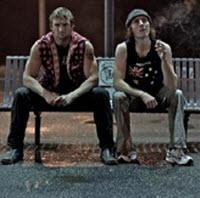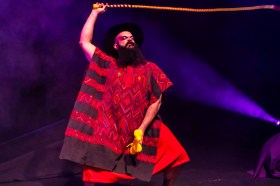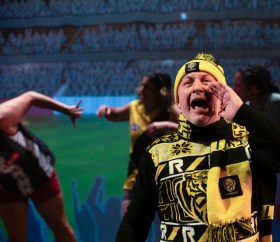Two angry yobs board the last train to Fremantle. The small and ratty Trev, contrasting with the grandiose and muscular Steve, find the perfect foil to their boredom when Lisa, a young law student, boards the train, swinging wildly between charm and outright threatening behaviour towards her. When another two characters, the initially introverted ‘writer’ and Maureen, a put-upon housewife, enter the scene, the play heads towards an overly convoluted climax.
The original insular and potentially explosive concept of the play, that of the train carriage at night, is sound. Unfortunately this underlying idea of a concept-driven set piece is the rule, rather than the exception to the play, with each of the characters remaining just that: types, vessels driving a script based in the narcissistic sense of shame the author, Reg Cribb, has drawn from a real-life experience of his own on the trains of suburban Perth.
Apparently, again according to the writer’s notes, he witnessed two yobs, thugs, name them what you will, harass and threaten a young woman on a train in a carriage full of passengers who failed to intervene. The writer’s guilt from not helping this woman in the first instance, and in taking the story of her trauma and making a play out of it in the second, can be an understandable point of artistic conflict. The proceeding half conceived attempts to salve these feelings of guilt are not. The ‘writer’ character transforms from the mute observer, to the Machiavellian, middle class artist, to unbalanced vigilante in a manner of minutes towards the end of the play, derailing any meaningful study of the variety of reactions human beings have towards aggression, vulnerability and peril. None of the characters are allowed either a picture of incompleteness or an ambiguous moral subtext. Each are driven by idealised concepts of love, passion, or revenge, unless of course the character is female, in which case their oblique and patronising motivations seem to be that they… well, had nothing better to do.
The central concept that the writer wants to explore is that of a disaffected masculinity, a manhood no longer in need. That is why everyone is drunk and stoned and violent, why this incident happened, because of a disaffected manhood. It is how the character of Lisa became a “battle scarred victim” to quote Cribb. It’s not that I don’t buy the argument; it certainly has resonance from when it was brought up in the post World War Two era. Then the post Vietnam era. Then the post Buffy era. But this play would only warrant further argument if it wasn’t for the presence of that pesky ‘writer’ character. His character is superfluous and as incoherent as Steve’s movement between being a swearin’ bogan and then completely changing the modulations of his dialogue to talk about Verdi. It’s not that a thug is incapable of talking about Verdi, just that the writer has an obvious expectation that you’re only capable of talking about him if you do so in a grandiloquent fashion. In the end we’re left with male characters, their heads in their hands, wondering where it all went wrong. Meanwhile the female characters are put down as they are picked up, useful objects to help the story unfold or for the men to identify with. Maureen isn’t a woman with slowly dwindling choices, she is the older lady who reminds Trev and Steve of their mum. Lisa is a woman to be threatened and rescued in equal measure, her only agency is that of disappearing once she is of no more use to the story.
The makers of the play, therefore, are left with an ensemble of characters whose only sure shot is of the protracted scream of rage and despair. The set is striking and gives a lot of scope for theatrical and physical manipulation of the confined tableau, but in such a confined space the air isn’t given to the characters to create a rhythmic rise and fall of tension, with a tendency to fall back on a level of projection which isn’t really warranted in the confined space of the Old Council Chambers. Unfortunately the effect of the stagecraft was lost on a script that lacked any coherent resonance, a clumsy stab at gender politics that is incapable of disentangling itself from the author’s own wish fulfilment.
TaDaa Productions present
The Return
written by Reg Cribb
directed by Andrew Gray
featuring Katy Brinson, Brendan McCallum, James Taylor, Emily Thomas and Anthony Winnick
The Return is a journey about everyday people on the last metropolitan train to Fremantle.
It will bring laughter, fear, threat and deceit … these stories may offend – please try not to judge.
Dates:
Preview: Wednesday, 2 May 2010 at 8.00pm
Season: 3 – 19 June 2010 (Tuesday – Saturday at 8.00pm)
Venue:
Trades Hall – Old Council Chambers
corner of Lygon Street and Victoria Street, Carlton
Tickets:
$28 Adult
$20 Concession
Bookings > Bella Union:
03 9650 5699
Or online





